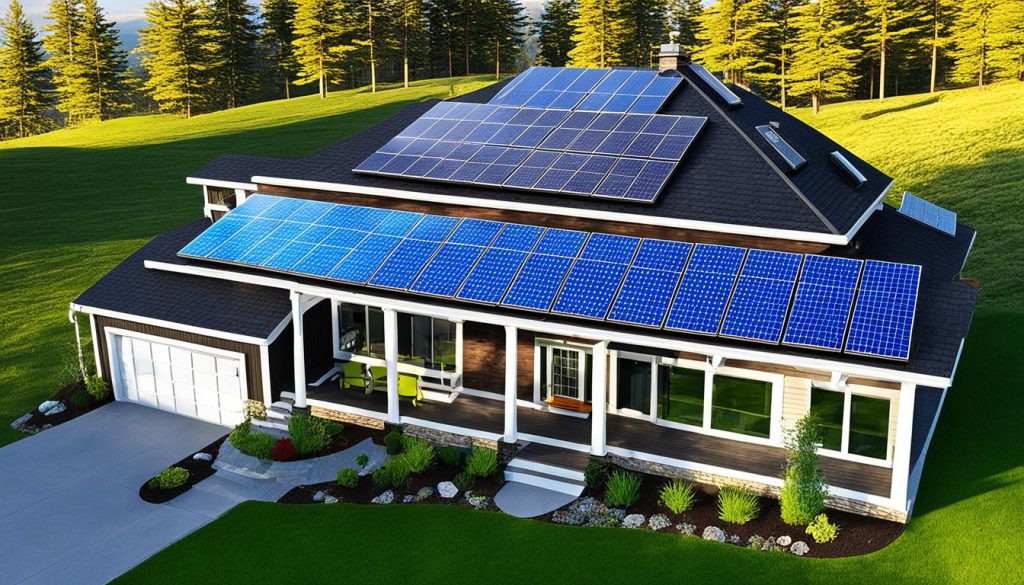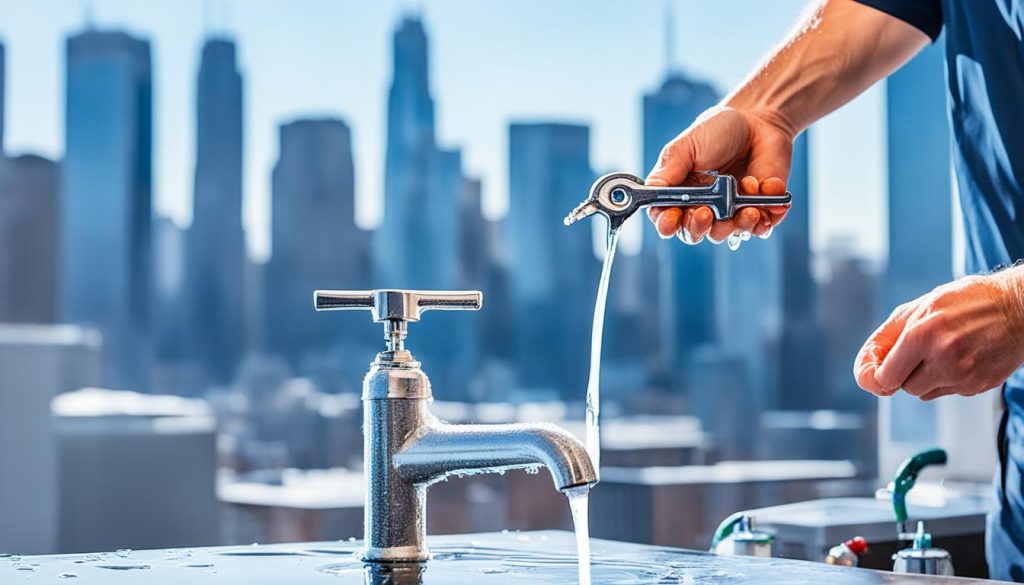Finding ways to cut down your monthly utility bills is key in today’s economy. This guide is for homeowners and renters alike. It offers expert advice to save on electricity, water, and other bills. We’ll cover everything from energy-efficient home upgrades to smart home tech and water-saving tips.
Key Takeaways
- Discover how to reduce utility bills by up to 5% with simple water-saving tactics1
- Learn about energy-efficient LED bulbs that consume up to 90% less energy than traditional bulbs1
- Explore affordable smart home technologies and electricity monitoring tools to identify energy-draining devices
- Understand the benefits of transitioning to renewable energy sources for your home
- Discover water conservation strategies and water-efficient appliances to save on water bills
By following the expert tips in this article, you can cut your utility costs. You’ll enjoy the financial perks of a more energy-efficient and sustainable home. Let’s get started on saving today!
Exploring Energy-Efficient Home Upgrades and Incentives
Making your home more energy-efficient is good for the planet and can save you money on bills. You can do this by upgrading insulation or buying ENERGY STAR-certified products. There are many ways to make your home better and get incentives and rebates.
Efficient Home Upgrades Tax Credits & Rebates
The government and utility companies offer tax credits and rebates to encourage homeowners to go green. These incentives can lower the cost of upgrades, making them easier to afford2. For instance, you can get a tax credit of up to 30% for certain appliances and water heaters, up to $2,000 per year2. You might also get rebates of up to $8,000 for certain heat pumps and $1,750 for water heaters2.
Homeowners can also get rebates for cutting energy use by 20% or more, with rewards from $4,000 to $8,0002. These programs help make it cheaper to upgrade insulation, windows, doors, and HVAC systems. This leads to saving money over time.
Find Savings with ENERGY STAR Certified Products
When buying new appliances and home improvements, look for the ENERGY STAR label3. These products use less energy, saving you money and helping the environment3. LEED-certified homes use 20 to 30 percent less energy than regular homes, sometimes up to 60 percent3.
Buying ENERGY STAR-certified appliances like refrigerators and washing machines can cut your energy use by 10 to 50 percent3. Switching to LED bulbs can save a household about $225 a year3. Using these efficient products in your home means lower bills and a greener future.
To get the most savings, plan your home upgrades carefully, using all available incentives and focusing on the biggest improvements. Investing in energy-efficient solutions cuts your bills and boosts your home’s value and sustainability423.
How to Save Money on Utility Bills
Utility bills can be a big expense for many families. But, there are ways to cut down your energy use and lower your bills. By using energy-efficient practices and choosing ENERGY STAR certified products, you can save money and help the environment.
Reduce Energy Consumption with ENERGY STAR
Choosing ENERGY STAR certified appliances and electronics is a smart move to save on bills. These products use less energy but still work well5. In fact, they can use 10 to 50 percent less energy each year6. Also, using smaller appliances like microwaves or toaster ovens can save a lot of energy compared to big ovens5.
Energy Efficiency Tips for Lowering Utility Costs
- Adjust your thermostat: Raising it just a few degrees can save you money. It’s about 60% of your bill5.
- Lower your water heater temperature: Setting it lower can save you money too5.
- Optimize your pool pump: Running it less can save you up to $100 a year5.
- Wash full loads: Adjust the water and wash full loads to save energy5.
- Reduce phantom energy: Using power strips and turning them off saves energy and money57.
- Maintain your refrigerator: Keeping it clean helps it work better5.
- Upgrade your showerhead: New showerheads use less water and save money6.
These tips can really help lower your utility bills. They save you money and are good for the planet67.
“Saving money on utility bills is not just about being eco-friendly – it’s about taking control of your household expenses and making the most of your hard-earned money.”
| Energy Efficiency Measure | Potential Savings |
|---|---|
| Adjusting thermostat 7-10 degrees | Up to 10% on heating and cooling costs7 |
| Lowering water heater temperature | Hundreds of dollars per year7 |
| Reducing phantom energy | Up to $100 per year7 |
| Using energy-efficient dishwashers | Up to 300 gallons of water annually6 |
| Upgrading to energy-efficient appliances | Up to 20% less energy usage6 |
Using these strategies and energy-efficient tech can really cut down your utility bills. It’s a win-win for your wallet and the planet567.
Renewable Energy Sources for Your Home
As we focus more on sustainable energy, looking into renewable energy for your home is smart. Renewable energy, like solar, wind, and geothermal, cuts down on carbon emissions and can save you money on bills. Let’s look at how switching to clean energy can benefit your home.
The Benefits of Transitioning to Clean Energy
Switching to renewable energy can lead to big savings. Geothermal heat pumps work better than air source ones, saving money in 10 to 15 years8. Solar water heating systems cost $5,000 to $7,000 and can help a family of four with half their hot water needs8. Solar PV systems are about $3 per watt, making a 7 kilowatt system around $21,000, and can produce 20 to 35 kilowatt-hours daily89. Wind energy is also an option, with costs ranging from $10,000 to $70,000 for a small system8. You need at least an acre of land and average winds over 10 miles per hour for wind energy8.
Going green is good for the planet too. Solar energy is a top choice for saving money, with benefits that outweigh the start-up costs9. With oil running out, prices going up, and environmental concerns, switching to renewable energy is urgent9. Choosing clean energy helps make a greener future and lowers your home’s carbon footprint.
Switching to renewable energy at home brings many perks, like saving money and helping the planet. By looking into solar, wind, and geothermal, you’re moving towards a greener, cheaper future. The savings and environmental benefits of renewable energy show why it’s key for our daily lives.9810
Water Conservation Tips and Strategies
Conserving water is good for the planet and can save you money on your bills. By using less water, you can cut down your monthly costs11.
Upgrading to water-efficient appliances and fixtures is a big step towards saving water. For example, low-flow toilets can save up to 13,000 gallons a year11. Also, using ENERGY STAR-certified dishwashers and washing machines can save a lot of water11.
Changing your daily habits can also help a lot. Turn off the tap while brushing your teeth, take shorter showers, and only do full laundry loads. These actions can greatly reduce your water use and lower your bills11.
| Water-Saving Technique | Potential Water Savings |
|---|---|
| Reduce shower time by 5 minutes | Up to 1,000 gallons per month12 |
| Install aerators on faucets and sinks | Thousands of gallons per year12 |
| Use a rain barrel for outdoor watering | Up to 50% of total water bill12 |
| Fix leaky faucets and toilets | Up to 200 gallons per day12 |
Keeping your plumbing in good shape is also key to saving water. Fixing leaks and keeping water heaters efficient can save you a lot of water and money12.
Smart watering for your lawn can also help. Watering in the cooler parts of the day, using plants that need less water, and adding mulch can all cut down on water use13.
By following these tips, you can manage your water use better and save on your bills. You’ll also help protect this precious resource111213.
Smart Home Technology for Energy Savings
Homeowners want to cut their utility bills and help the planet. Smart home tech is changing the game. With smart devices and systems, you can save a lot of energy and control your home’s energy use14.
Programmable Thermostats and Energy Management Systems
Programmable thermostats are a big win for saving energy. They let you set the temperature and adjust it automatically. Devices like the Google Nest™ and Ecobee® can save you up to 15% on heating and cooling, which means saving $131–$145 a year15.
Energy management systems offer even more control. They connect with smart devices like lights and appliances. This gives you a clear view of your energy use. You can then make smart choices to use less energy and lower your bills14.
Smart tech can also spot energy waste. For instance, smart leak detectors watch your water use and alert you to leaks. This helps you fix leaks fast, saving water and money14.
Smart home tech also boosts home security and might even get you insurance discounts14.
To get the most from smart home tech, make sure it works with your current setup. Do your homework to pick the best products. And don’t forget to look for rebates or incentives from your utility or local government14.
By using smart home tech, you can manage your energy use better. This means lower bills and helping the planet141615.
Conclusion
By following the expert tips in this article, you can save money on your utility bills right away. Using energy-efficient appliances with an ENERGY STAR rating can cut down your energy use and bills17. Also, tankless water heaters and low-flow showerheads reduce water use, which lowers your costs17.
Unplugging electronics when not in use cuts standby power and saves electricity17. Adjusting your thermostat to energy-efficient temperatures saves on heating and cooling costs17. Switching to LED lighting is costly upfront but saves energy over time since LEDs last longer18.
Drying clothes on a clothesline or rack uses less electricity than a dryer17. A home energy audit finds energy waste and helps you use less energy17.
Using these tips and exploring energy-efficient upgrades and incentives can help you manage your utility bills better. Small changes can add up to big savings over time. Start making these changes now for a more sustainable and cost-effective home.
FAQ
What are some energy-efficient home upgrades and incentives available to me?
How can I reduce my energy consumption and save money on utility bills?
What are the benefits of transitioning to renewable energy sources for my home?
How can I implement water conservation tips and strategies to save money on my utility bills?
How can smart home technology help me achieve energy savings and lower my utility bills?
Source Links
- 20 easy ways to save on electricity and water bills at home
- Home Upgrades
- Guide To Energy Efficient Homes | Bankrate
- The 8 Best Energy Efficient Home Upgrades
- FPL | Ways to Save
- 5 Effective Tips For Lowering Your Utility Bills
- Crushed Under Gas, Electric and Water Bills? Here Are 8 Easy Ways to Save Money
- Residential Renewable Energy
- How to Save Money with Renewable Energy at Your Home
- 10 ways to lower your utility bill in California – ENACT
- How to Save on Water Bill: 5 Expert Tips | TRADESAFE
- How to Achieve Water Savings and Water Conservation – HydroFLOW USA: Award Winning Water Treatment Devices
- 25 ways to save water
- How smart home products can save money and energy
- Save money and electricity with these 4 smart home devices | Asurion
- How to Save Money and Energy With Smart Home Devices
- 7 Tips To Reduce Your Utility Bills Each Month
- How to Save Money On Utilities: 11 Tips | Mercury Insurance



